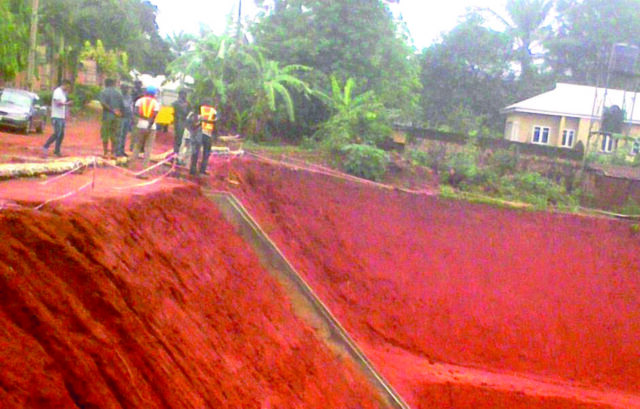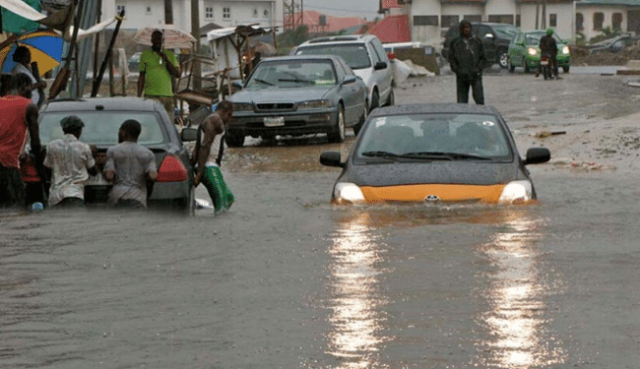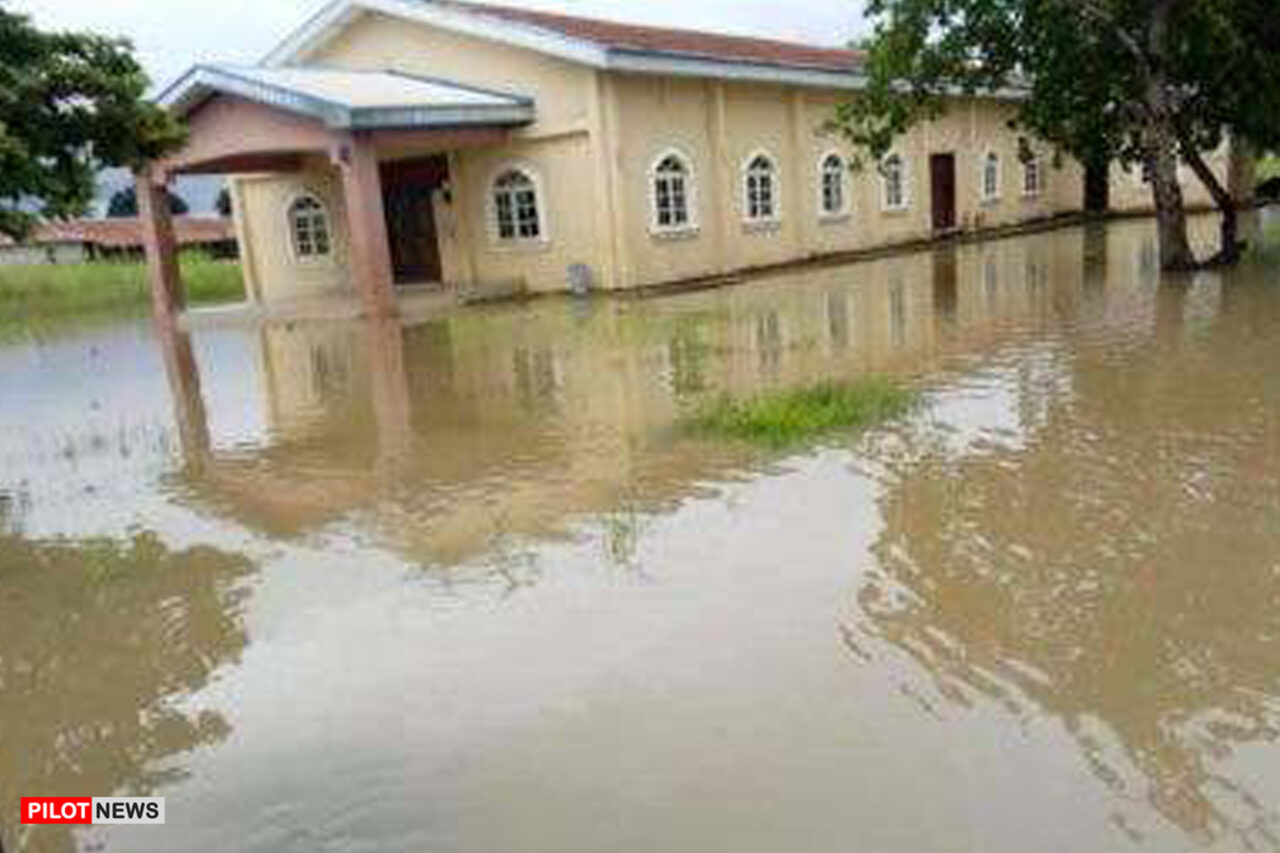Special Report by Ebuka Onyekwelu
“NIHSA wishes to use this medium to advise state and local government, stakeholders, multinational companies and public-spirited individuals and philanthropists that all hands should be on deck to save the country from the consequences of flood pandemic in the year 2020”.
Only a few months ago, precisely in July, the Nigeria Hydrological Services Agency – NIHSA- had warned that several Nigerian states are at the risk of experiencing “massive flooding”. In the list released by the agency, Abia, Adamawa, Anambra, Bauchi, Bayelsa, Benue, top the list of high-risk states, among other twenty-one states of the federation on that list. The Director-General of NIHSA, Clement Nze, also warned that of the seven hundred and seventy-four local governments in Nigeria, a total of two hundred and seventy-five local governments are facing serious threat of flood. This warning came after heavy downpour led to flash flooding which resulted in the death of about eleven people in Niger state, in July.
A statement by Nze, NIHSA DG, reads in part, “NIHSA wishes to use this medium to advise state and local government, stakeholders, multinational companies and public-spirited individuals and philanthropists that all hands should be on deck to save the country from the consequences of flood pandemic in the year 2020”. Going forward, he advised that “blocked drainages and gutters should be cleared, river channels dredged and structures within the waterways and flood plains paths pulled down”, even as he declared that “More floods are still expected in the months of August, September and October”. This prediction has proved to be true.
In Anambra state, there are concerns as to the level of an increased flood, once it rains. In Awka the state capital, floodwaters with intense torrents that can wash away anything on its way, temporarily shut the popular Arthur Eze Avenue. This situation is not different at Ziks avenue, one of the most popular roads in Awka, which leads to the popular Eke Awka market and the Nkwo Amaenyi market in Awka. The situation is such that many traders and businessmen and women now close up their shops whenever it gets cloudy or with any sign of the slightest clue that rain is about to fall. Gutters on both sides of the road are usually full to the brim and overflow with a high level of water covering the road such that the drainage cannot be identified anymore, everywhere is covered by floodwater and it stays like that till sometime after the end of the rain, before it rescinds.

Around Obinagu, Amawbia, Kwata, with a lot of residents, the flood has become a major concern to residents and it is easily blamed on bad roads and poor drainage. In parts of Agu-Awka GRA, Awka, precisely at Nwakpadolu avenue, once it rains, it is practically insane for any person to attempt to use that road. Awka the Anambra state capital is clearly not one of the communities located in the riverine areas of Anambra state, however, it is experiencing intense flooding. Similarly, in Obosi and Ogidi both in Idemili North local government area of Anambra state and in parts of Otolo, Nnewi in Nnewi North Local Government Area of Anambra state, there are several reports of serious flooding that are raising the concerns of residents.
“Flood can be caused by two factors; it can be human, it can be topographical”, said Fidelis Ubah, a consultant environmentalist based in Awka, Anambra state. “From the aspect of human factors, you talk about indiscriminate disposal of waste, in the process of doing that, drainages are blocked, water channels are blocked. Now natural water catchment areas are also blocked as well. In situations like that occur, obviously you will have the issue of people’s shops, people’s houses get flooded during heavy downpours”. For the topographical factors, “It is a situation whereby you have high land and water tends to move from areas of high land to low land. Now people living within areas of this high land automatically are at risk. If it rains, you have more volumes of water coming down compared to people living in the plain; that is table land”. For the consultant environmentalist, many cases of flooding in Anambra are based on the above two factors. “In the case of Anambra, these are the two basic reasons why we are having flooding, although Anambra is relatively a table land”.

For Fidelis, the major reason why Anambra is experiencing flooding aside its proximity to the Niger River is the indiscriminate disposal of waste. “The predominant factor leading to flooding in Anambra state is human”, Fidelis said. He went further to buttress thus, “first of all, you get uncontrolled construction of buildings, residential structures, people constructing and channeling their drainages wrongly. You have people disposing of wastes blocking the drainages we have that are supposed to be functional, they are not functional, they are blocked”.
On the side of the government, for the environmentalist, the government has not done enough especially in terms of enforcement and ensuring that people dispose of their wastes correctly. “Government already knows that people do not comply with proper disposal of refuse, what has the government done to get the people key in”? Now, considering that drainages are blocked, “the drainages are supposed to be distilled at least once every two years, let’s not say once in a year because we know it will not be attainable”. However, he remarked that “drainages blocked as a result of water carrying loads that are not necessarily waste, for example; sand, those ones are not human factors, they are environmental”, he concluded.
In Anambra state, sights of mountainous refuse dumps abound, especially in the urban areas. Remarkable is the dumpsite along Owerri-Onitsha road located in Oba/Obosi, just by the expressway. In Nnewi, Okwenu hill just before the Coscharis junction is notorious for piles of refuse dumb. Efforts by the government to contain indiscriminate refuse disposal by introducing big waste pans in strategic positions across the state have not been fully utilized by residents. Many times, the waste pans are filled to the brim but still not disposed of and emptied such that it can remain there in the open for days. Though most recently, efforts have been doubled by the Anambra state Waste Management Agency in this regard. Yet, waste management remains a big challenge across Anambra state, and sights of refuse dumped inside the drainage remain common across cities in Anambra state. Yet, residents commonly blame the government for not doing enough to curb or restrict the incidences of flood in the state.
In a brief interview with the West African Pilot News Columnist earlier today, Hon. Edward Ibuzo the Anambra State House of Assembly Committee Chairman on Environment decried the situation where gutters across the state are used as refuse dumps and consequently blocked, although the problem is beyond drainage blockage. “You know, part of the issue we are having is drainage blockage, although this kind of flood we are having now is not 100% drainage blockage, it is nature. The River Niger is overflowing”, Hon. Ibuzo said. Speaking on some of the measures the government is taking to contain the impact flood will have on those that are affected, Ibuzo hinted that the government has set up camps where displaced people can stay temporary. He also mentioned that Anambra state Clear Drainage and Forest Preservation Agency Bill which was presented to the House of Assembly received an accelerated hearing and passage into law, as part of the measures his committee has taken to put flood in Anambra, under check. “The government is doing everything possible to ensure that people are safe from flood disaster”.
Reacting to what his agency is doing to address flood in Anambra state in an exclusive interview with the West African Pilot News Columnist, the Chairman of the Anambra State Clear Drainage and Forest Preservation Agency, Hon. Chido Obidiegwu, observed that flood is not peculiar to Anambra state. “Flood is not peculiar to Anambra state. But the thing about Anambra is that the soil texture we have in the state is what makes it look as if ours is worse than others. Notwithstanding, the governor in his wisdom set up this agency to address issues that bother on the causes of this flood, especially the man-made causes”, Hon. Chido Obidiegwu said. Examining the man-made causes, Obidiegwu questioned, “what are the real man-made causes of the flood? “It’s essentially attitudinal”, Hon. Obidiegwu said.
Furthermore, he remarked, “Our people feel that environmental issues should just be that of government. That is why someone will have a drink from sachet water and just drop it, at the end of the day, they accumulate and go to block the drainage system, the resultant effect becomes flood”, he concluded. Taking a critical look at the many complaints of Anambra residents that government is not doing anything to address flood, Hon. Obidiegwu asked, “is it really true that government is not doing anything? It is not true”, he averred. “Before now, the Governor set up a committee with the Deputy Governor, the SSG, Local Government Commissioner, myself and others as members of the Committee. We started phases of clearing drainages in Anambra state and went to all the local governments. Now, we are on a second trench and we have done six local governments and we are focusing on flashpoints and red flag areas”. More so he continued, “We complain of the road but the flood compromises the integrity of our roads.
People also cut trees indiscriminately. Corn sellers dump their waste into the gutter, these are the issues, it is a collective responsibility”. Obidiegwu then appealed to Anambra residents to take responsibility. “We cannot come to your compound, and your drainage is blocked and you expect the government to clarify that for you. We are appealing to the people to do their own part of the bargain and allow the government to do its own part of the bargain”.
He also extended the appeal to corporate organizations, religious leaders, youths and other stakeholders to assist with clearing blocked drainages, even as he assured that the Agency is ever ready to partner with any willing entity in this regard and accord them due recognition. “We can only tame flood. We cannot stop it, but we are doing our best and we cannot stop till we accomplish our mandate”, Hon. Obidiegwu assured.
In the meantime, Anambra government must rise to avert the growing fears of residents caused by threats of flood, through continuous sensitization of the public. Residents must deliberately take their refuse to government-approved refuse dump for proper disposal. As many Anambra residents so easily put the flood incidence blame on the government relying on bad roads and poor drainage systems; even as the people expect the government to take responsibility and do better, the people themselves must also take responsibility and stop the indiscriminate disposal of refuse inside drainages and water channels.


